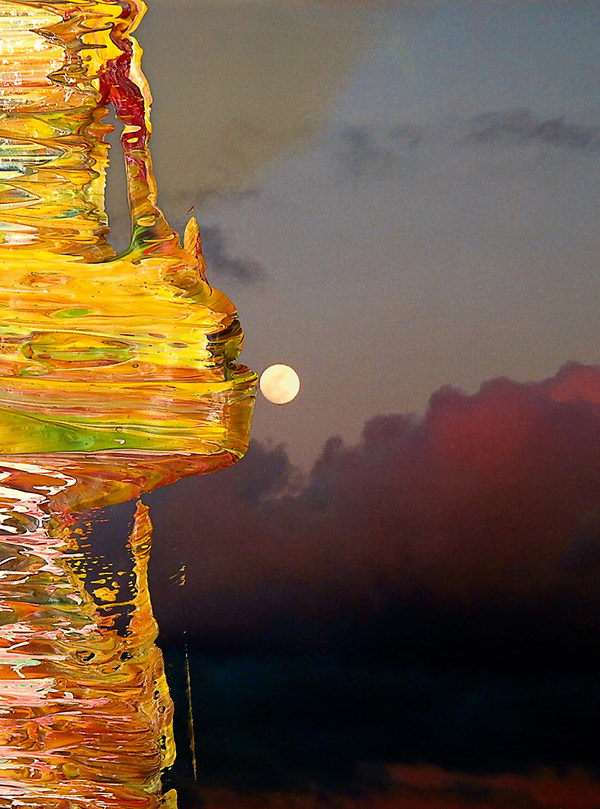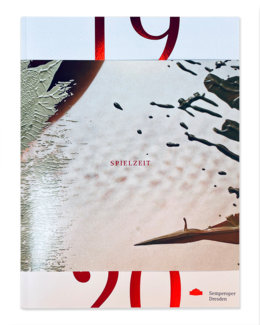Spielzeit 2019/20
Semperoper Dresden
Premieres 2019/20
»Il viaggio a Reims/ The Journey to Reims«
Following its reconstruction in the 1980s, Gioachino Rossini’s hilarious comedy »The Journey to Reims« has enjoyed great success at the world’s top opera venues. Composed for the coronation of King Charles X of France, the work tells of guests from all over Europe who get stuck on the road to Reims, where they want to take part in the festivities. With no fewer than ten lead roles, this is a feast of bel canto singing and a showpiece for every opera house. In staging this Dresden premiere, Italian director Laura Scozzi, making her debut at the Semperoper, shifted the story to today’s European Parliament, thereby turning »Il viaggio a Reims/ The Journey to Reims« into a scathing satire.
»Le Grand Macabre«
Performed for the first time in Dresden at the beginning of the 2019/20 season, György Ligeti’s only opera, »Le Grand Macabre«, is another key work of the 20th century. Written by the Hungarian composer in 1977, this unique work paints a grotesque doomsday scenario at the same time while throwing a whole range of operatic conventions overboard. Outstanding actor-singers such as Markus Marquardt, Gerhart Siegel, Iris Vermillion, Hila Baggio, Frode Olsen and others made the production a must-see event. Ligeti’s opera was staged by star director Calixto Bieito, whose highly acclaimed production of »Moses und Aron« launched Peter Theiler’s directorship in the 2018/19 season. This co-production with Teatro Real Madrid was conducted by Omer Meir Wellber, the Semperoper’s principal guest conductor.
»Iphigenie auf Tauris«
This joint production of the Semperoper and Semperoper Ballett is a true artistic highlight. Pina Bausch’s interpretation of Gluck’s opera »Iphigénie en Tauride« from 1974 is a legendary choreography that the Tanztheater Wuppertal still regularly performs. The Semperoper Ballett under Aaron S. Watkin was in fact the first external dance company granted permission to include the work in its repertoire. Rooted in the traditions of German Expressionist dance, this early work by Pina Bausch unites song and choreography in a way that still fascinates and moves – and, furthermore, enables a thrilling collaboration between the Semperoper Ballett, the vocal soloists of the opera company, the State Opera Chorus and the Dresden Staatskapelle. This production of »Iphigenie auf Tauris« not only expands the repertoire of the Semperoper Ballett to include a groundbreaking choreography, but also looks back over the history of dance in Dresden over the 20th century, featuring such great names as Mary Wigman and Gret Palucca.
»Die Meistersinger von Nürnberg«
Dresden’s opera house was only the second venue to perform Richard Wagner’s »Die Meistersinger von Nürnberg« following the premiere in Munich. Subsequently, there have been nine productions of this work in the Saxon capital. Christian Thielemann, principal conductor of the Staatskapelle Dresden and one of the world’s leading Wagnerian interpreters, clearly positions himself within this tradition, viewing the opera from the perspective of German Spieloper. Jens-Daniel Herzog’s production, bursting with theatrical poetry, interrogates the impact of art on social discourse and the relationship between tradition and innovation. The brilliant roster of singers was led by bass Georg Zeppenfeld, making his celebrated debut as Hans Sachs, supported by Klaus Florian Vogt as Stolzing and Adrian Eröd as Beckmesser. »Die Meistersinger von Nürnberg« was developed as a co-production with the Salzburg Easter Festival, the Tokyo Bunka Kaikan and the New National Theatre/Tokyo.
»Die Großherzogin von Gerolstein/ The Grand Duchess of Gerolstein«
While operetta is not really part of the Semperoper’s core repertoire, lighter works with close links to the operatic tradition have always been performed here. Surprisingly, however, Dresden audiences never before had the chance to hear Jacques Offenbach’s military satire »The Grand Duchess of Gerolstein«. To mark the 200th anniversary of Jacques Offenbach’s birth, Josef E. Köpplinger, also a directorial debutant at the Semperoper, moved the setting of this example of »opéra bouffe«, with its tale of political machinations, to a fictional German statelet. The star-studded ensemble was led by soprano Anne Schwanewilms, who thus continued the long and illustrious tradition of great opera singers in the role of the frivolous Grand Duchesses.
»Der goldene Drache/ The Golden Dragon«
Hungary’s Peter Eötvös is one of today’s leading opera composers. In his works, he brings topical issues to the operatic stage using texts by contemporary playwrights. His chamber opera from 2014, »Der goldene Drache« (»The Golden Dragon«), based on Roland Schimmelpfennig’s play of the same name, deals with illegal immigration, social deprivation and the brutality of lives lived in the shadows. In our Semper Zwei venue, the young director Barbora Horáková, winner of the RING-AWARD 2017, made her directorial debut in Dresden with the local premiere of »Der goldene Drache«. This work by the orchestra’s composer-in-residence for the 2019/20 season was conducted by the upcoming young maestro Petr Popelka, a former double bass player of the Staatskapelle.
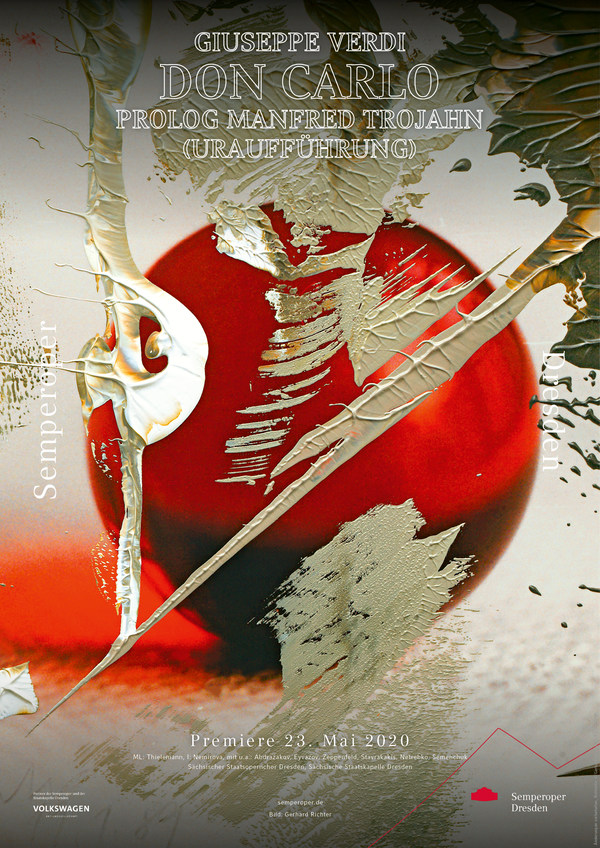
»Don Carlo«
This new production of Giuseppe Verdi’s »Don Carlo« conducted by Christian Thielemann and staged by Vera Nemirova was scheduled for spring 2020 as a co-production with the Salzburg Easter Festival. Set designer Heike Scheele created a monumental library space for this opera about power and the suppression of free-thinking. A special feature of this production: composer Manfred Trojahn wrote a new instrumental prologue to set up the background to the drama and transport us into Verdi’s sound world. After both the Salzburg and Dresden premieres with Anna Netrebko in the role of Elisabeth of Valois were cancelled due to the coronavirus pandemic, it was again Anna Netrebko and Yusif Eyvazov who inaugurated the reopening of the Semperoper after the spring lockdown of 2020 with a concert performance of arias and duets from »Don Carlo« accompanied by a chamber ensemble.
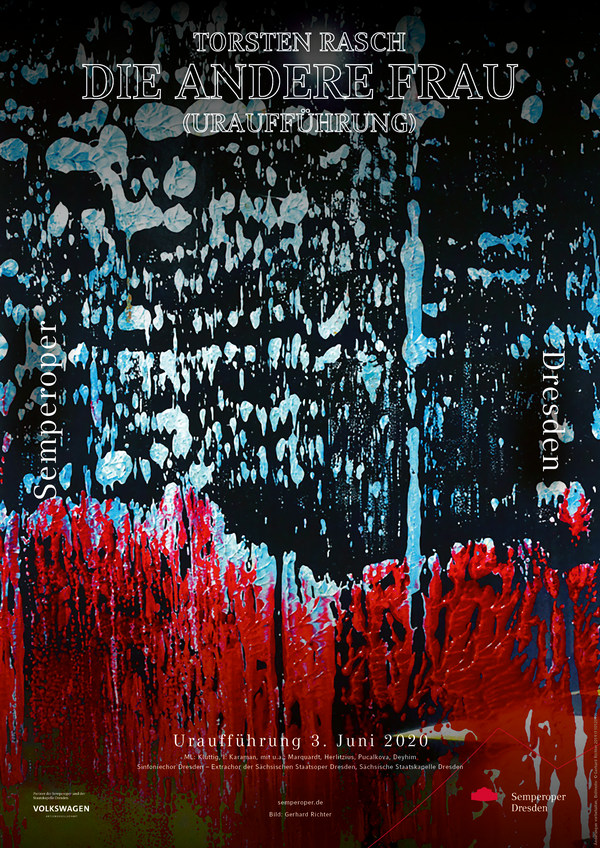
»Die andere Frau«
Over the years the Semperoper has hosted many world premieres. The opera house’s most recent commission is »Die andere Frau« (»The Other Wife«) by composer Torsten Rasch, who created an opera around the biblical story of Abraham and Sarah. An exciting tale of three individuals and their entangled relationship, this work also deals with the emergence of the three great monotheistic religions. Born in Dresden in 1964, Torsten Rasch is a hugely versatile composer, having written operas and orchestral pieces as well as film scores. The young director Immo Karaman, who makes his Dresden debut in this staging of »Die andere Frau«, places the audience in the middle of the action, namely on the stage of the Semperoper. Alongside the main protagonists, the production also features the Iranian singer Sussan Deyhim. Due to the coronavirus pandemic, the production was postponed to the 2021/22 season.
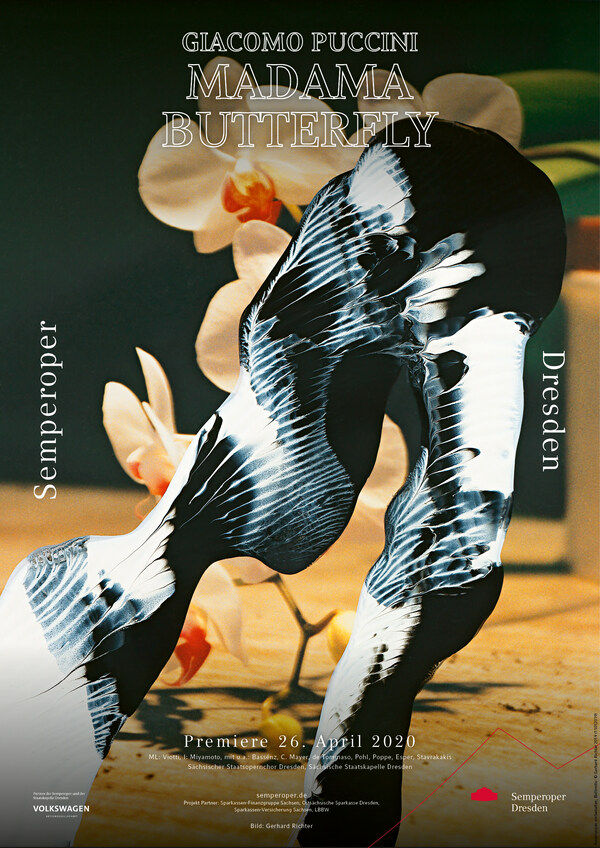
»Madama Butterfly«
Co-produced with the Tokyo Nikikai Opera Foundation and Det Kongelige Teater Copenhagen, this staging of Giacomo Puccini’s »Madama Butterfly« was supposed to open at the Semperoper on 26 April 2020 following its successful premiere in Japan, but had to be postponed to the 2021/22 season due to the coronavirus pandemic. The task of interpreting this beloved classic of the opera repertoire fell to the Japanese director Amon Miyamoto, who is equally at home in the traditional Japanese theatrical forms of Nō and Kabuki as in occidental plays, musical and opera. This production of »Madama Butterfly« will give Dresden audiences a first taste of his work. Together with set designer Boris Kudlička and fashion icon Kenzō Takada, who died in 2020, Amon Miyamoto developed his unique take on the Japanese-American story of doomed love, a tale which also displays some antiquated Western notions of 19th century Japan.

»Wie werde ich reich und glücklich?«
The Dresden premiere of Mischa Spoliansky’s cabaret revue »Wie werde ich reich und glücklich?« (»How can I become rich and happy?«), directed by Manfred Weiß, was supposed to be performed in Semper Zwei on 5 April 2020, but had to be postponed to the 2021/22 season due to the coronavirus pandemic. Originally produced in 1930 at Berlin’s Komödie am Kurfürstendamm, this sardonic, jazzy work by Mischa Spoliansky and his librettist Felix Joachimson explores people’s sorrows and hardships but also their courage to get on with life at a time of crisis. And it investigates the still relevant topics of self-improvement and contentment. Following the performances of »Alles Schwindel«, this production is a further stepping-stone in the rehabilitation of Mischa Spoliansky’s reputation, who from 1903 received part of his musical training in Dresden under Mark Günzburg, and in 1933 was forced to emigrate to England to escape Nazi persecution.
Spielzeit 2019/20
Season 2019/20
Artistic concept for the presentation of the premieres
Overpainted photographs by Gerhard Richter

